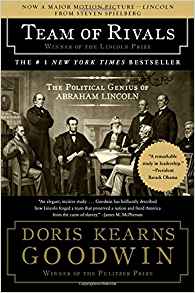Team of Rivals by Doris Kearns Goodwin
By Eric Antoine Scuccimarra I think enough has been written about this book that there is not much more I can say. It is an amazingly vivid and detailed account of the presidency of Abraham Lincoln, painstakingly researched and very engaging. I highly recommend it.
I think enough has been written about this book that there is not much more I can say. It is an amazingly vivid and detailed account of the presidency of Abraham Lincoln, painstakingly researched and very engaging. I highly recommend it.
In the beginning of the book it mentions how Lincoln used to debate the portrayal of George Washington in America at the time (and still today) as a flawless saint-like hero. Apparently the issue was over whether it was more important to have national heros or to have a realistic account of history. In American schools this is not an issue - history is always presented as a constant march forward - every problem mentioned is eventually "solved", the personal and political flaws of presidents are never discussed, and the United States never does anything wrong. In my high school American History textbook I remember there being maybe one paragraph about Watergate and maybe a few sentences about the downsides of the Vietnam War. Anything questionable that the US government had ever done - such as supporting authoritarian dictatorships and military coups in the interest of opposing communism - were never even mentioned. Apparently it is more important for American public schools to instill a sense of patriotism and nationalism than to present any sort of objective analysis of history.
After having read the Caro books on LBJ, where Johnson's many, many flaws were detailed, I expected this book to be a more realistic depiction of Lincoln, who was presented in my history class as a saint on par with George Washington and Jesus. I was rather shocked to find very few, if any, negative things about Lincoln. If this is an accurate portrayal then he probably really was close to being the greatest person who has ever lived, and by far the best American president ever. But, being a skeptic at heart, I still have my doubts.
I am a bit conflicted about the Civil War. While ending slavery was a goal worth fighting over, the other side is that Lincoln's presidency was really the turning point where the power flipped from being primarily held by the states to being held by the federal government. While merely a rationalization for protecting slavery, state's rights is in my opinion an important concept and one that I wish had been preserved.
If we assume that the country is split roughly 50-50 on a major issue, whatever the government decides to do half the country is not going to be happy about it. If laws are created on a local level each state can make its own decision based on what the people of that state want, which should reduce the percentage of people unhappy with each decision. It seems obvious to me that the more locally decisions are made the better the government will respond to the will of the people. The current system, where the federal government decides most everything and the states can only decide what the federal government allows them to, is in my opinion a recipe for creating the kind of division witnessed in the US today.
As a little tangent, I am not sure I agree that in a democracy the federal government has the right to keep states from seceding. I have been thinking about this lately in light of the Catalan independence referendum in Spain. If the Catalonians don't want to be part of Spain what right do the Spanish people have to dictate what they can or cannot do? Is the the "consent of the people" a non-revokable agreement which will bind everyone and their posterity in perpetuity? Can I grant "consent" for people who are not yet born or do they need to grant it themselves? However, by trying to maintain their "peculiar institution" (without the consent of the slaves) the South lost the right to make any of these types of arguments.
The constitution gives more power to the states than to the federal government, and the Civil War was the point where the federal government really started taking all of that power. Lincoln was only able to issue the Emancipation Proclamation as a war-time necessity - he did not believe he had the constitutional power to override state laws in a time of peace. Unfortunately Lincoln was assassinated taking with him his moral compass and greater purpose, which was replaced with the petty ambitions, greed and desire for revenge of Andrew Johnson and the radical republicans. If Lincoln had lived it is certain that Reconstruction would have gone very differently, and who knows, the country might have been a much better place than it currently is.